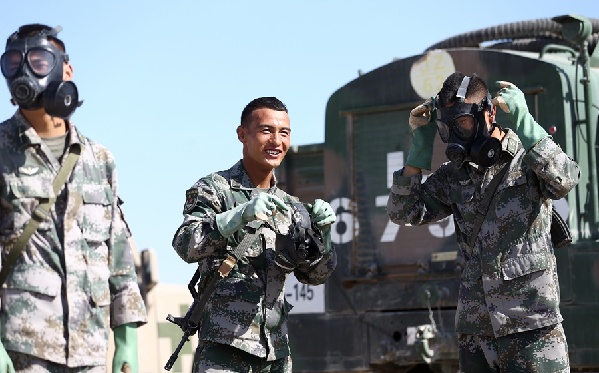PLA plays to its strengths in war games
 0 Comment(s)
0 Comment(s) Print
Print E-mail China Daily, August 14, 2017
E-mail China Daily, August 14, 2017
|
Chinese soldiers (from left) Liu Wei, Sodnam Tobgyal and Xue Fanyu prepare for an event that simulates a chemical warfare situation. [Photo/China Daily] |
Despite the fact it weighs 13.6 metric tons, Lu Bo steered the crew's 86A through the obstacle course like it was a family car cruising on a city street. This, he said, is due to the fact he treats the vehicle like his baby.
An obsessive grease monkey, the 29-year-old said he learned about the importance of keeping a vehicle in top condition the hard way in the 2015 International Army Games, when his IFV almost hit a concrete block after the engine suddenly stalled because it had not been maintained properly.
"There's no room for errors like that in actual combat," said Lu Bo, who was named best driver in the Suvorov Attack section this year.
Major General Xu Youze, who headed the judging panel for the Suvorov Attack section, added: "The Ground Force encourages soldiers to be creative and find the combat methods that suit them best. If two IFVs meet in actual combat, only the one that can launch an attack first will survive. So being the fastest is what we train for."
Speed is also critical in the Gunsmith Master section, which tests a military's ability in installing and repairing various weapons in battlefield conditions.
Maintenance is key to winning battles, according to Tian Fuping, deputy chief of staff for the Xinjiang Military Region. He added, "Our combat training in recent years has not only required our maintenance crews to be gunsmith masters, but also to be fighters first."
And it wasn't just the soldiers who were put through their paces in Korla-China's weaponry was also put to the test. Except for the BMP-2 IFV, all the hardware used in the competition was provided by China.
"The competition saw the weaponry used in extreme conditions. We will collect data on any problems and pass it on to manufacturers to further develop Chinese weaponry," Major General Zhang said.
After completing their final Clear Sky mission on Wednesday, Lu Donghua and his team highlighted another important skill for soldiers: endurance. Once back at base, all three got out of their IFV and instantly began to vomit.
"The temperature in the vehicle was over 50 C, so it was really uncomfortable. We just had to deal with it because there is no comfort in combat," Lu Donghua added.
'Exorcists' protect against hidden dangers
Unlike most soldiers, Zhang Lidong is trained to fight an invisible enemy.
"Our job is to remove the demon that normal people cannot see," the 25-year-old private said of his unit, which is trained to deal with chemical, biological and nuclear threats that could cause mass casualties. "That's why we call ourselves 'The Exorcists'," he added.
Zhang, whose antichemical warfare regiment is based in Beijing, commanded the two Chinese crews that competed in this month's International Army Games in the desert near Korla, Xinjiang Uygur autonomous region.







Go to Forum >>0 Comment(s)